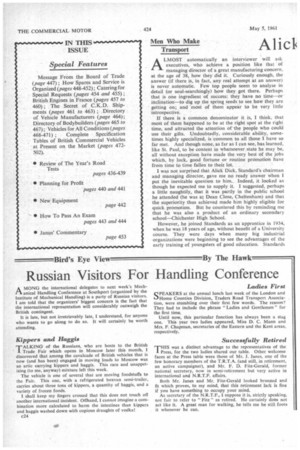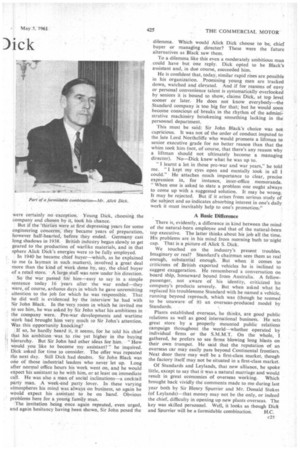Alict
Page 64

Page 65

If you've noticed an error in this article please click here to report it so we can fix it.
LMOST automatically an interviewer will ask executives, who achieve a position like that of managing director of a great manufacturing concern. at the age of 38, how they did it. Curiously enough, the answer (if there is, in fact, any real attempt at an answer) is never automatic. Few top people seem to analyse in detail (or soul-searchingly) how they got there. Perhaps that is one ingredient of success: they have no time—or inclination—to dig up the spring seeds to see how they are getting on; and most of them appear to be very little introspective.
If there is a common denominator it is, I think, that most of them happened to be at the right spot at the right time, and attracted the attention of the people who could use their gifts. Undoubtedly, considerable ability, sometimes highly specialized, is common to all those I have so far met. And though none, as far as I can see, has learned, like St. Paul, to be content in whatsoever state he may be, all without exception have made the very best of the jobs which, by luck, good fortune or routine promotion have from time to time fallen to their lot.
I was not surprised that Alick Dick, Standard's chairman and managing director, gave me no ready answer when I put the inevitable question to him.. Indeed, it looked as though he expected me to supply it. I suggested, perhaps a little naughtily, that it was partly in the public school he attended (he was at Dean Close, Cheltenham) and that the superiority thus achieved made him highly eligible for quick promotion. But he countered this by reminding me that he was also a product of an ordinary secondary school—Chichester High School.
However, he joined Standards as an apprentice in 1934, when he was 18 years of age, without benefit of a University course. They were days when many big industrial organizations were beginning to see the advantages of the early training of youngsters of good education. Standards
were certainly no exception. Young Dick, choosing the company and chosen by it, took his chance.
But if the 'thirties were at first depressing years for some engineering concerns, they became years of preparation, however half-hearted, before they ended_ Germany cast long shadows in 1938. British industry began slowly to get geared to the production of warlike materials, and in that sphere Alick Dick's energies were to be fully employed.
In 1940 he became chief buyer—which, as he explained to me (a layman in such matters), involved a great deal more than the kind of work done by, say, the chief buyer of a retail store. A large staff was now under his direction.
So the war passed fcir him—easy to say in a simple sentence today 16 years after the war ended—they were, of course, arduous days in which he gave unremitting attention to the job for which he was responsible. That he did well is evidenced by the interview he had with Sir John Black. In the very room in which he invited me to see him, he was asked by Sir John what his ambitions in the company were. Pre-war developments and wartime work had brought him very much to Sir John's attention. Was this opportunity knocking?
If so, he hardly heard it, it seems, for he told his chief that his ambition -was to rise yet higher in the buying hierarchy. But Sir John had other ideas for him. "How would you like to become my assistant?" he inquired. Dick asked for time to consider. The offer was repeated the next day. Still Dick had doubts, Sir John Black was one of those industrial leaders who never let up. Long after normal office hours his work went on, and he would expect his assistant to be with him, or at least on immediate call. He was also a man of social inclinations—a cocktail party man. A week-end party lover. In these varying atmospheres his mind was always on business, so again he would expect his assistant to be on hand. Obvious problems here for a young family man.
The invitation being once again repeated, even urged, and again hesitancy having been shown, Sir John posed the
dilemma. Which would Alick Dick choose to be, chief buyer or managing director? These were the future alternatives as Black saw them.
To a dilemma like this even a moderately ambitious man could have but one reply. Dick opted to be Black's assistant and, in due course, succeeded him.
He is confident that, today, similar rapid rises are possible in his organization. Promising young men are tracked down, watched and elevated. And if for reasons of envy or personal convenience talent is systematically overlooked by seniors it is bound to show, claims Dick, at top level sooner or later. He does not know everybody—the Standard company is too big for that; but he would soon become conscious of breaks in the rhythm of the administrative machinery betokening something lacking in the personnel department.
This must be said: Sir John Black's choice was not capricious. It was not of the order of conduct imputed to the late Lord Northcliffe who would promote a liftman to senior executive grade for no better reason than that the whim took him (not, of course, that there's any reason why a liftman should not ultimately become a managing director). No—Dick knew what he was up to.
"I learnt a lot in those pre-war and war years," he told me. "1 kept my eyes open and mentally took in all I could." He attaches much importance to clear, precise expression in, for instance, inter-office memoranda. "When one is asked to state a problem one ought always to come up with a suggested solution. It may be wrong. It may be rejected. But if it arises from serious study of the subject and so indicates absorbing interest in one's daily work it must inevitably help to one's promotion."
A Basic Difference There is, evidently, a difference in kind between the mind of the natural-born employee and that of the natural-born top executive. The latter thinks about his job all the time. His problems are in his mind from morning bath to-night cap. That is a picture of Alick S. Dick.
We touched on the industry's present troubles. Imaginary or real? Standard's chairman sees them as real enough, substantial enough. But when it comes to criticisms of British exported vehicles he is inclined to suggest exaggeration. He remembered a conversation on board ship, homeward bound from Australia. A fellowpassenger, not aware of his identity, criticized his company's products severely. But when asked what he replaced his troublesome Standard with he named a vehicle, running beyond reproach, which was (though he seemed to be unaware of it) an overseas-prodUced model by Standards.
Plants established overseas, he thinks, are good public relations as well as good international business. He sets great store by a properly mounted public relations campaign throughout the world—whether operated by individual firms or the S.M.M.T. On the whole, I gathered, he prefers to see firms blowing long blasts on their own trumpet. He said that the reputation of an overseas car may easily pass beyond Continental frontiers, Next door there may well be a first-class market, though the factory itself may not be situated in a first-class market.
Of Standards and Leylands, that new alliance, he spoke little, except to say that it was a natural marriage and would result in great economies of overseas working. Which brought back vividly the comments made to me during last year both by Sir Henry Spurrier and Mr. Donald Stokes (of Leylands)—that money may not be the only, or indeed the chief, difficulty in opening up new plants overseas. The key was skilled personnel. Well, it looks as though Dick and Spurrier will be a formidable combination. H.C.








































































































































































































































































